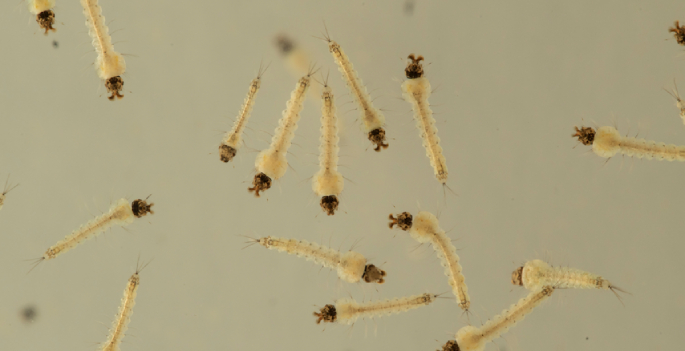
THE IDEA
Mosquito larvae are surprisingly complex, with a sophisticated sense of smell that enables them to find food, avoid predators and thus become healthy adult mosquitoes with greater ability to transmit disease to humans.
While it was previously known that water-dwelling mosquito larvae can taste chemicals in the water, this research is the first to show that they can also stick their antennae just above the water's surface and detect odors in the air.

"We've dissected and defined the idea that larvae do sample volatiles from environment through electrophysiological and behavioral research," said L.J. Zwiebel, Cornelius Vanderbilt Chair and professor of biological sciences and lead researcher of this study. "We then looked at the neurobiology of that process and showed it to be a sophisticated and much more complex story than people imagined." Despite having just about 20 neurons-compared to a grown mosquito's almost 2,000-larvae can process a large amount of information beyond what might typically be expected of an "immature" organism.
WHY IT MATTERS
Mosquitoes are the most dangerous disease vector insects in the world, transmitting diseases including malaria, dengue fever, Zika virus, West Nile virus, Chikungunya virus and filariasis.
Zweibel calls our relationship with mosquitoes a "know thy enemy" situation, and this discovery gives researchers a more complete understanding of the critically important life stage that is the target for the majority of mosquito control programs. "Understanding how larvae sense the world gives us ideas about how to keep them where we want them and away from where we don't," Zwiebel said. "By understanding a larvae's adult-like sophistication, we can envision ways to make them weaker adults and reduce their ability to transmit disease."
WHAT'S NEXT
The Zwiebel lab will continue to study mosquitoes in their role as disease vectors, with a focus on the surprisingly complex mosquito larvae. Looking further into how the larval receptor neurons work may provide insights into how they act in the adult female mosquitoes that bite us.
Zwiebel is translating his research into a suite of commercial products with guidance from the Center for Technology Transfer and Commercialization.
FUNDING
This work was supported by the National Institutes of Health National Institute of Allergy and Infectious Diseases grant AI127693.
GO DEEPER
The article, "Neuronal Odor Coding in the Larval Sensory Cone of Anopheles coluzzii: Complex Responses from a Simple System" was published in the journal Cell Reports on August 17.
Researchers on this project include Vanderbilt trainees and postdoctoral researchers Huahua Sun, Alex (Feng) Liu and Adam Baker; long-time collaborator and retired Vanderbilt professor H. Willi Honegger; and Georg Raiser, a researcher with the Champalimaud Centre for the Unknown in Lisbon, Portugal.






